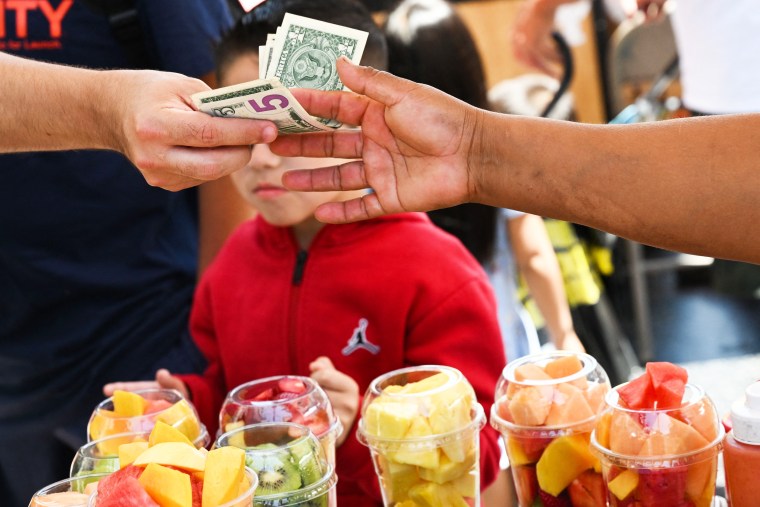MIAMI — Higher prices for housing, food and gas are hitting Americans throughout the United States, but Latinos and Blacks are affected more by the current rise in inflation than the overall population, according to an analysis from the Federal Reserve Bank of New York.
The growing cost of living has made it difficult for Cynthia Fabian, 48, of Miami, to get back on her feet after she lost her job at a major retailer at the beginning of the pandemic.
She lost her home and then exhausted her savings paying for a motel room. Fabian eventually turned to a shelter and has been working odd jobs.
But high inflation, including soaring rents, has made it impossible for her to move to her own apartment with the $1,500 budget she has.
“I feel frustrated and angry that I haven’t been able to get out of this situation,” Fabian said.
The greater impact on Latinos and Blacks stands in contrast to the period from 2019 to May 2020 when those groups experienced lower inflation than the overall average. Both spend larger shares of their budgets on goods that have been hit the hardest by inflation, particularly transportation, like used cars and gas, as well as housing, researchers found. In contrast, a smaller part of their budget is spent on items that have seen relatively little inflation, like education, health care and entertainment.
In Miami, rents have skyrocketed, and together with food and gas prices, the cost of living has become unaffordable for some. Camillus House, an organization that aids those at risk of losing their homes — and the place Fabian turned to for help — says they have received an uptick in calls in recent months.
The high demand for their services has been taxing and has stretched their resources.
“The situation has been challenging, both for the clients who live in our emergency housing programs, or our temporary programs, and for families that are calling us for assistance because they are on the verge of homelessness,” said Camillus House CEO Hilda Fernández.
"There has been no option but to be creative in our approach,” Fernández added.
She said they have used federal funds to give incentives to landlords to rent to their clients and are encouraging roommate relationships so renters can share costs.
During the pandemic, Latino and Black renters across the country were more likely to report that their household was not caught up on rent, according to the Center on Budget and Policy Priorities, a nonpartisan research and policy institute. The pandemic has had a disproportionate effect on Latino and Black workers, and inflation is now making it difficult for them to catch up.
Consumers paid significantly more for goods in June when prices shot up 9.1 percent from a year ago. It’s the biggest 12-month jump since 1981. Although fuel prices fell in July, it’s unknown if that trend will continue. Factory shutdowns, shipping shortages and Russia’s invasion of Ukraine have disrupted gas and food supplies.
The rising food prices are causing food insecurity throughout the country. The number of people who reported having “high food insecurity” over the past 30 days returned to the level it was at the beginning of the pandemic when the country went into lockdown, according to an analysis by the Urban Institute, a Washington-based think tank. Food banks and pantries across the country are scrambling to meet demand as the long lines of cars that filled television screens at the beginning of the pandemic start to make a comeback.
The statistics are reflected in what the Los Angeles Regional Food Bank has been grappling with for the past few months.
“With the local unemployment rate decreasing from more than 20% at the height of the pandemic to the current 5% rate, we expected the demand for food assistance to decrease this year,” said Michael Flood, the food bank's president and CEO. “But with the impact of inflation, we are now serving more people who are working — sometimes multiple jobs — and are struggling to make ends meet due in part to rising prices for food, fuel and other expenses.”
Tony Luprecio, 66, was at Del Aire Baptist Church in Hawthorne, a city in the Los Angeles metropolitan area, on Wednesday looking for food donations. It was the third time he had gone in recent weeks.
For 15 years he had a successful business selling produce to restaurants and other businesses. Pandemic lockdowns forced him to close.
“My business went down to nothing,” Luprecio said.
He decided to retire, but the soaring food and gas prices have left him thinking it’s time to return to work. His son helps him with bills and his wife is working part-time, but it’s not enough.
“It’s super hard for me. That’s why I’m here,” Luprecio said. “It’s rough when you have money and a good life, and then it disappears.”
Follow NBC Latino on Facebook, Twitter and Instagram.

